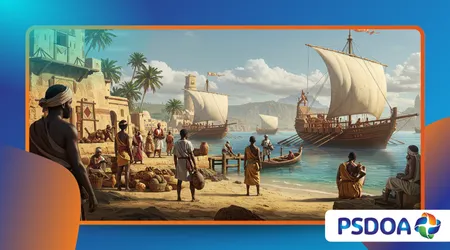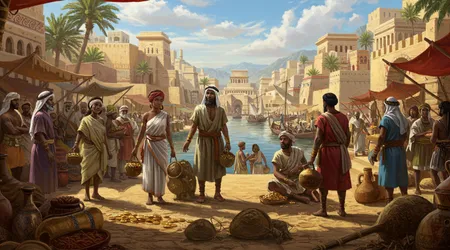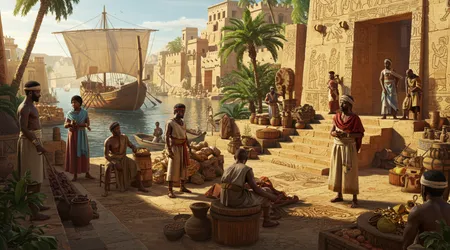The Hidden Role of Africa in Ancient Global Trade

Hidden role of Africa in ancient global trade unveils a narrative often overshadowed by Eurocentric histories.
Anúncios
Africa, far from a passive player, was a dynamic hub in ancient commerce, connecting continents through intricate networks of exchange.
From the sun-scorched sands of the Sahara to the bustling ports of the Swahili Coast, African societies shaped global trade long before modern borders existed.
This article dives into the vibrant, often forgotten contributions of African civilizations to ancient economies, revealing their sophistication, ingenuity, and global influence.
Why have these stories been sidelined for so long? Let’s explore the evidence, from archaeological finds to oral traditions, that paints a vivid picture of Africa’s pivotal role in the ancient world.
Anúncios
The continent’s strategic position, bridging the Mediterranean, Indian Ocean, and trans-Saharan routes, made it a linchpin in early global trade.
Gold, ivory, and salt flowed from African markets, fueling empires and sparking cultural exchanges. This exploration challenges outdated narratives, offering a fresh lens on Africa’s economic and cultural legacy.
We’ll uncover trade routes, key commodities, cultural impacts, and modern archaeological discoveries, weaving a story that celebrates Africa’s enduring influence.
Africa’s Strategic Trade Networks
Ancient Africa was no isolated backwater; its trade networks were arteries of global commerce. The trans-Saharan trade, for instance, linked West Africa to North Africa and beyond.
Caravans laden with gold and salt traversed deserts, connecting empires like Mali and Songhai to Mediterranean ports.
These routes weren’t just economic they fostered cultural and technological exchanges, shaping societies across continents.
The Swahili Coast, along East Africa, buzzed with maritime activity. Ports like Kilwa and Mombasa traded with Arabia, India, and China by 1000 CE.
Archaeological evidence, like Chinese porcelain found in Great Zimbabwe, underscores these far-reaching connections.
++ The Forgotten Scientists Who Laid the Groundwork for Modern Physics
African traders weren’t passive; they dictated terms, leveraging local resources to command global markets.
These networks reveal Africa’s agency in ancient trade. Coastal cities thrived on monsoon-driven commerce, exporting ivory and importing silk.
The hidden role of Africa in ancient global trade shines through in these bustling hubs, where diverse cultures mingled, creating vibrant economic ecosystems.

Key Commodities and Their Global Impact
Africa’s wealth in resources drove ancient trade. Gold from West Africa powered Mediterranean economies, with Mali’s mines supplying half the world’s gold by 1300 CE, according to historian Ibn Khaldun.
Salt, vital for preservation, was equally prized, often traded ounce-for-ounce with gold. These commodities shaped global markets, drawing traders from distant lands.
Ivory and exotic skins from East Africa adorned royal courts in Asia and Europe. The hidden role of Africa in ancient global trade is evident in how these goods fueled demand, spurring maritime innovation.
African artisans crafted goods for export, blending local expertise with foreign influences, creating unique trade items.
Also read: The Ancient Supercontinent That Few People Know About
The impact extended beyond economics. Trade goods carried cultural significance, like ostrich feathers symbolizing status in Persian markets.
Africa’s resources didn’t just fill coffers they shaped tastes, technologies, and power dynamics across ancient civilizations.
| Commodity | Source Region | Primary Destinations | Estimated Trade Peak |
|---|---|---|---|
| Gold | West Africa | Mediterranean, Middle East | 1200–1500 CE |
| Salt | Sahara Region | West Africa, Europe | 1000–1400 CE |
| Ivory | East Africa | India, China, Arabia | 800–1300 CE |
| Copper | Central Africa | Swahili Coast, India | 900–1200 CE |
Cultural Exchange Through Trade
Trade wasn’t just about goods; it was a conduit for ideas. The hidden role of Africa in ancient global trade included spreading knowledge, religion, and art.
Islam reached West Africa via trans-Saharan routes, blending with local traditions to create unique cultural syntheses, like Timbuktu’s scholarly centers.
Swahili traders adopted Arabic script, enhancing record-keeping and diplomacy. In return, African motifs influenced Indian textiles, as seen in Gujarat’s block-printed fabrics.
These exchanges weren’t one-sided; Africa actively shaped global culture, contributing to everything from mathematics to architecture.
Read more: How the Dark Ages Were Not So Dark After All
Imagine a caravan crossing the Sahara, carrying not just gold but stories, songs, and philosophies. This cultural flow enriched societies, proving Africa’s trade was a bridge between worlds.
The hidden role of Africa in ancient global trade lies in these intangible exports, as vital as any commodity.
Archaeological Evidence Rewriting History
Recent discoveries illuminate the hidden role of Africa in ancient global trade. Excavations at Oued Beht in Morocco, published in Antiquity (2025), reveal a farming society from 3400–2900 BCE trading with Iberia.
Pottery and stone figures suggest shared rituals, linking Africa to Mediterranean networks.
In East Africa, Great Zimbabwe’s ruins hold Chinese ceramics, evidence of trade with Asia by 1000 CE. These finds challenge Eurocentric views, showing Africa as a proactive player.
The hidden role of Africa in ancient global trade emerges in these artifacts, proving sophisticated economies predated colonial narratives.
Such discoveries demand we rethink history. African societies weren’t peripheral; they were central to global exchange.
Ongoing digs in Mali and Tanzania continue to uncover evidence, urging historians to amplify Africa’s voice in ancient trade narratives.
Africa’s Influence on Maritime Innovation
The hidden role of Africa in ancient global trade extended to maritime advancements. Swahili sailors mastered monsoon winds, navigating the Indian Ocean with dhows.
These ships, built with local timber, carried African goods to distant shores, rivaling Asian and Arab fleets.
Port cities like Sofala developed sophisticated docks, facilitating trade with Persia and India. An analogy: Africa’s ports were like ancient airports, bustling hubs connecting continents.
The hidden role of Africa in ancient global trade shines in these innovations, which enabled reliable, long-distance commerce.
Maritime trade also spurred cultural blending. Swahili architecture, with coral stone mosques, reflects Persian and Indian influences.
Africa’s sailors didn’t just transport goods they carried ideas, shaping global maritime culture and technology.

Modern Implications and Rediscovering Africa’s Legacy
The hidden role of Africa in ancient global trade has modern relevance. Recognizing Africa’s historical agency counters narratives of dependency.
In 2025, the China-Africa Economic and Trade Expo highlights Africa’s growing role in global markets, echoing ancient networks.
Rediscovering this legacy empowers African nations today. By studying ancient trade, policymakers can draw on historical resilience to navigate modern economic challenges.
The hidden role of Africa in ancient global trade reminds us that Africa’s economic prowess is not new it’s a continuation of millennia-old expertise.
This history also inspires cultural pride. Museums in Nigeria and Kenya are showcasing artifacts, sparking global interest.
By embracing this past, Africa reclaims its narrative, proving its contributions to humanity’s story are profound and enduring.
Frequently Asked Questions
What evidence supports Africa’s role in ancient global trade?
Archaeological finds, like Chinese porcelain in Great Zimbabwe and Moroccan pottery from 3400 BCE, show extensive trade networks across continents.
How did African trade influence other cultures?
African goods, like gold and ivory, and cultural exports, like art and religion, shaped Asian, European, and Middle Eastern societies.
This exploration of the hidden role of Africa in ancient global trade reveals a continent central to humanity’s economic and cultural evolution.
From gold-laden caravans to monsoon-navigating dhows, African societies were architects of global exchange.
By unearthing these stories, we not only rewrite history but also inspire a future where Africa’s legacy is fully celebrated.
